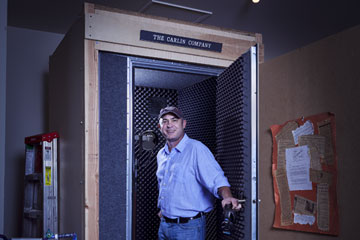
Web-radio host Dan Carlin in his garage studio.
Correction Appended: Sept. 20, 2013
It's 10 A.M. and Dan Carlin is groaning. Stuck in bed with a bad back, he is nonetheless poring over a half-dozen thick volumes sprawled before him. Carlin, 47, is the host of the popular Internet-radio programs Hardcore History and Common Sense. In front of him lies a fraction of the research he'll eventually use to produce his next four-or five-hour-long audio broadcast, the exact subject of which is a closely guarded secret.
Carlin's brand of storytelling has garnered Hardcore History, the more popular of his shows, nearly a million listeners per episode. The program is filled with anything but the drowsy stuff of high school textbooks. Its topics tend toward the apocalyptic: biological warfare's impact on humanity, murderous millennial preachers of the 16th century, the genocides of the Mongol Khans.
Carlin is one of a raft of entrepreneurs reinventing a medium long judged a money pit: Web radio, or podcasting. Some of them have broken into the mainstream. Satirist Marc Maron, for instance, has appeared on Comedy Central and is a frequent guest on Conan. Others, like The Nerdist Podcast, mine subcultures for show topics. And many are hosted by comedians seeking new outlets, including Adam Carolla and Jason and Randy Sklar, whose program Sklarbro Country is essentially sports radio with jokes.
The most successful hosts are even giving traditional media a run for their money. Carlin's most recent history broadcast, for example, was downloaded more than 40,000 times by fans within the first hour of its release. Considering that some prime-time networks draw in a few hundred thousand viewers a night, it's not hard to see why the medium is getting another look.
A Second Coming
Though online radio shows and podcasts have been around for more than a decade, established media businesses have mostly given up on profiting from them in recent years. What's different about shows like Carlin's? As advertisers shift their spending onto the Internet, some are now seeking out personalities with loyal followings to vouch for them. Part of the appeal is that rather than inserting typical audio ads, the new radio pitchmen tend to endorse products and services directly or read sponsored messages during the show--a practice reaching back to the golden age of radio.
As a result, NextMarket Insights analyst Michael Wolf estimates that the most popular podcasts are bringing in from $20 to $80 per 1,000 listeners. That makes them one of the most lucrative advertising formats on the Internet. By comparison, typical banner ads generate a mere $2.66 per 1,000 views on average, according to analysis by Forrester Research. For a weekly program with a million listeners, that could mean revenue of up to $4 million a year.
